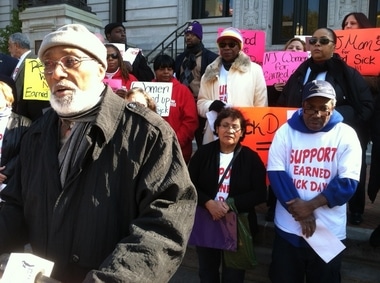At Newark City Hall, Support Builds for Paid Sick Time

The march toward mandatory paid sick leave in New Jersey’s largest city took a step forward tonight, when the City Council voted unanimously to introduce an ordinance that would require Newark businesses to pay their workers for time spent at home sick or caring for a ailing loved one.
Two additional council votes, as well as a public hearing and the mayor’s signature, are required to adopt the measure, which proponents said could happen as early as December.

Peter Lamont, who voluntarily provides sick time to the three employees of his Newark printing company, Porta Print, spoke in support of mandatory sick pay during a rally this afternoon outside City Hall. Standing behind him to his left were Gertrudes Contreras and Derick Swaby, who said they do not receive sick pay as jet cabin cleaners at Newark Liberty International Airport.(Steve Strunsky/The Star-Ledger)
Tonight’s approval was expected, after advocates for paid sick time joined a majority of the council for a rally outside City Hall this afternoon, hours before the council meeting.
During the rally, Councilwoman Mildred Crump recalled one winter when her father’s bad cold developed into pneumonia after several bitter mornings trudging to catch his bus.
“I watched my parents go to work sick because there was no such thing as paid sick leave and they had four children who needed to eat,” Crump said. “Shame on anyone who says this is not a good idea. Shame on them. They need to walk a mile in our shoes.”
Leaders of Local 32BJ of the Service Employees International Union, the Communications Workers of America District 1 council, New Jersey Citizen Action and others held signs reading, “NJ Moms for earned sick days,” and “All Dunkin Donuts workers need paid sick days.”
They cheered Crump and other council members in support of the requirement, which advocates say would apply to 38,000 Newark workers.
Two of them, Gertrudes Contreras and Derick Swaby, who work cleaning jets at Newark Liberty International Airport, told supporters they must report to their demanding, low-wage jobs even while ill because they can’t afford to stay home.
“If I don’t work, I don’t get paid,” Swaby said.
Newark’s initial vote to mandate paid sick leave comes one week after Jersey City Mayor Steven Fulop signed a similar ordinance, making his city the sixth municipality in the nation to adopt such a requirement after New York, Washington, D.C., San Francisco, Portland, Ore., and Seattle. Connecticut has a statewide law.
North Ward Councilman Anibal Ramos is sponsoring the Newark ordinance, which would mandate that full- and part-time workers in businesses with 10 or more employees earn one hour of sick time for every 30 hours worked, up to 40 hours per year. Workers in smaller businesses would earn one hour of sick time for every 30 hours worked, up to 24 hours annually.
Workers in direct contact with the public, including waiters or retail clerks, would earn up to five sick days, regardless of their company’s size, to care for themselves or family members.
Ramos, Crump and fellow council members Ras Baraka, Carlos Gonzalez, Ron Rice, Darin Sharif and Luis Quintana attended the rally. Quintana, the council president, is expected to be named interim mayor after Mayor Cory Booker is sworn in as a U.S. senator, and Quintana is then expected to sign the sick pay measure.
Advocates say paid sick time is good not only for ailing workers and their families, but for the public, which would be less likely to contract ailments.
Proponents also say it’s good for businesses, citing studies indicating that paid sick time increases productivity and reduces costly turnover.
But some business groups, including the New Jersey Business & Industry Association and the state Chamber of Commerce, oppose mandatory sick pay, insisting it will discourage companies from moving to the state’s two largest cities during the delicate economic recovery. They say mandating sick pay places one more burden on businesses already facing rising property taxes, payroll tax hikes to replenish the state unemployment fund, and a potential minimum wage increase coming to a statewide vote on Nov. 6.
“Nobody, but nobody can tell me what the cost of Obamacare will be,” said Michael Egenton, senior vice president for government relations at the state Chamber of Commerce. “You’ve got minimum wage, you’ve got mandatory sick leave, you’ve got the Affordable Care Act, you’ve got higher payroll taxes. You’ve got all of these issues that are piled on top of one another that impact our members.”